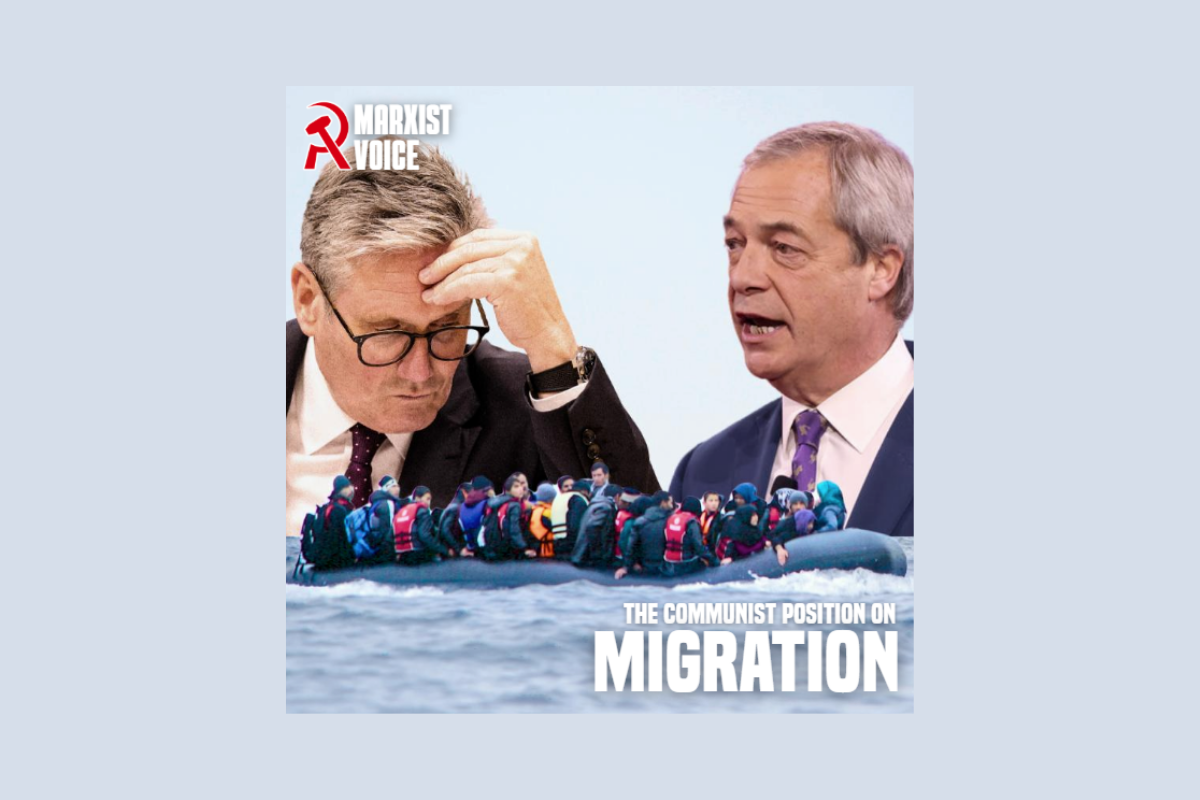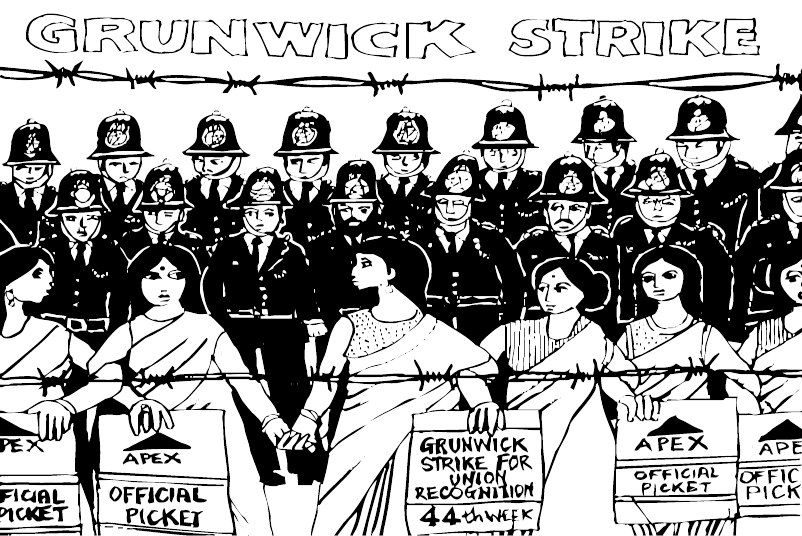To commemorate the 50th anniversary since the death of Martin Luther King Jr., we publish here an extract from a longer article examining the evolution of MLK’s politics. By the time of his assassination, he was drawing socialist conclusions.
50 years ago, on 4th April 1968, Dr. Martin Luther King Jr. – the leader of the civil rights movement in America – was shot dead in cold blood. On that day, Dr. King was in Memphis, Tennessee, to lead a demonstration and rally in support of a three-month-long fight for trade union recognition by 1,300 local refuse collectors.
There was widespread support for the strike and, a week before, King had led a march of 15,000 through the town. Memphis police officers and National Guardsmen had broken up the protest with tear gas and clubs.
He was staying at the Lorraine Motel. Just after 6pm, he and a couple of friends came out onto the balcony to chat to a few people in the car park below. Everything was relaxed and friendly. A musician friend was with him who had composed a version of ‘Precious Lord, Take Me by Thy Hand’. King asked him to play it at the rally: “I really want you to play that tonight”, he said.
Then a gunshot rung out and King slumped down, blood rushing from his jaw and neck.
It took 15 minutes for the ambulance to arrive, but King was losing blood fast. He was taken to St Joseph’s Hospital. Half-an-hour later he was pronounced dead. He was just 39-years-old.
The shooting echoed that of Malcolm X, who had repudiated the ‘non-violence’ strategy for the black civil rights movement being put forward at the time by Martin Luther King, and who was himself assassinated in February 1965.
They were both killed because they were becoming more radical. Malcolm X was drawing revolutionary conclusions. Dr. King was opposed to the Vietnam war and was taking up the plight of the poor.
It was the issues of poverty, class and anti-war that were pushing Dr. King further in the direction of Malcolm X. For this reason, he was murdered.
We are republishing here extracts from a 2006 article by Roland Sheppard. Roland is a retired Business Representative of Painters District Council #8 in San Francisco. He has been a lifelong social activist and socialist. He regularly attended Malcolm X’s meetings in Harlem and was in charge of defence whenever Malcolm X spoke at the Militant Labour Forum in New York City from 1964-1965. He witnessed Malcolm X’s assassination at the Audubon Ballroom, on 21 February 1965.
This article is, in many ways, even more relevant today in the wake of the Black Lives Matter protests that have erupted across America in recent years. These protests echoed those that took place in cities and ghettos in the days following the death of Dr. King.
The black workers and youth of America came out onto the streets to show their anger, reflecting their growing politicisation following the earlier Chicago Uprising of 1966 and the ‘long hot summer’ riots of 1967 in Newark, New Jersey, Maryland and Detroit, to name but a few.
They understood that the shooting was an assassination, not the mad act of a ‘lone gunman’, as the government would later claim. This further shift in mood by the black masses in America would define the coming months and years and would paralyse an establishment which had responded to their struggle only with violence, a tactic they would stick to with bloody results.
The photos of smoke rising from burning buildings in Washington, blowing across Capitol Hill would become a defining symbol of the rising discontent of the black masses against the war, racism and poverty.
From the King assassination onwards, the many inconsistencies in the government’s case that James Earl Ray was the sole assassin were well-publicised. When COINTELPRO’s [an acronym for COunter INTELligence PROgram, a series of covert, and at times illegal, projects conducted by the United States Federal Bureau of Investigation FBI aimed at surveying, infiltrating, discrediting and disrupting domestic political organisations] operations against the civil rights movement, the anti-war movement, and radicals and socialists were exposed, the United States House of Representatives’ Select Committee on Assassinations, under pressure from these exposures and the Civil Rights Movement, conducted an investigation in 1979 with the purpose of reconfirming the government’s case.
Immediately after it released the report affirming that Ray was the lone assassin, this committee sealed all of the evidence it had in its possession for 50 years (until 2029). Thus, we were left with nothing but the integrity of the senators to justify their findings, rather than the facts. The only logical reason to keep the files secret is to protect the guilty.
Recently, new facts on this assassination have come to light. On 8 December 1999, a jury awarded Coretta Scott King and her family $100 in damages, resulting from a conspiracy to murder her late husband, Martin Luther King. The trial was initiated by the admission of Lloyd Jowers on national TV in 1993 that he had hired King’s assassin as a favour to an underworld figure who was a friend. At the conclusion of the trial, Dexter King, Dr. King’s son, said:
“After today, we don’t want questions like, ‘Do you believe James Earl Ray killed your father?’ I’ve been hearing that all my life. No, I don’t, and this is the end of it. This was the most incredible cover-up of the century, and now it has been exposed. Now we can finally move on with our lives.”
The King family, along with their attorney, William Pepper, plan to lobby historians and elected officials to get the official record of the assassination changed. There have always been many unanswered questions about the assassination of Martin Luther King Jr. From the beginning it has been clear that the FBI was involved to one degree or another.
The FBI leaked information to the Memphis press that King was going to be staying at a white hotel a couple of days prior to his arrival in the city. This forced King to stay at the less secure Lorraine Motel.
The question remains: Why would the government be part of the conspiracy against King? Why would they want him dead?
The capitalist nightmare
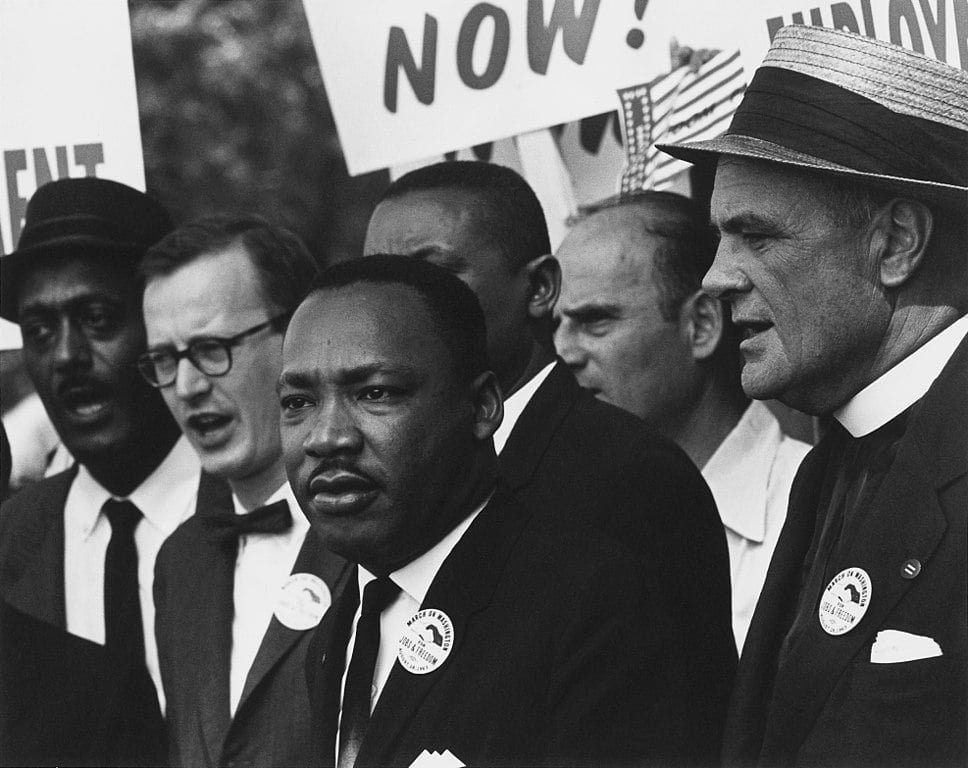 A key to understanding the government’s motive is that Martin Luther King had a different political perspective at the time of his death than when he made his 1963 ‘I Have a Dream’ speech.
A key to understanding the government’s motive is that Martin Luther King had a different political perspective at the time of his death than when he made his 1963 ‘I Have a Dream’ speech.
His final speeches and actions reveal that he had begun to view the struggle for equality as an economic struggle and the capitalist economic system as the problem.
In one of his last speeches, given at Stanford University in April 1967 and titled the ‘The Other America,’ King addressed the problem of the rich and the poor in this country.
Instead of his dream, he talked about the nightmare of the economic condition facing blacks. He talked about “work-starved men searching for jobs that did not exist”; about the black population living on a “lonely island of poverty surrounded by an ocean of material prosperity”; and about living in a “triple ghetto of race, poverty, and human misery.”
He explained that after World War II, the unemployment rate between blacks and whites was equal and that in the years between then and 1967, black unemployment had become double the rate for white workers. He also spoke about how black workers made half the wages of white workers.
From his experience, when he started his campaign for equality in Chicago and elsewhere in the north, King concluded in this speech that to deal with this problem of the Two Americas was much more difficult getting rid of legal segregation. He pointed out that the northern liberals, who had given moral and financial support to the struggle against Jim Crow, would not give such support to the efforts to end economic segregation.
He also polemicized against the concept that people should pick themselves up by their own bootstraps. In the course of explaining the obstacles that blacks faced coming into this country that Europeans did not have, he stated: “It is a cruel jest to say to a bootless man to pick himself up by his own bootstraps.” Black people, he said, were “impoverished aliens in their own land.”
Against racism, war, and poverty
In this speech King also opposed the war in Vietnam. He criticized the government for spending hundreds of millions of dollars for war and not for promoting national equality. He stated his goal to organise and mobilise forces to fight for economic equality. In his last letter, requesting support for the March on Washington for Jobs and Freedom in 1968, he wrote:
“It was obdurate government callousness to misery that first stoked the flames of rage and frustration. With unemployment a scourge in Negro ghettos, the government still tinkers with half-hearted measures, refuses still to become an employer of last resort. It asks the business community to solve the problems as though its past failures qualified it for success.”
He also stated this outlook at the SCLC Convention of August 1967:
“We’ve got to begin to ask questions about the whole society. We are called upon to help the discouraged beggars in life’s marketplace. But one day we must come to see that an edifice which produces beggars needs restructuring. It means that questions must be raised. ‘Who owns this oil? … Who owns the iron ore?… Why is it that people have to pay water bills in a world that is two-thirds water?”
In another major speech in 1967, King also stated the course that he was planning to take in the fight for economic equality:
“There is nothing but a lack of social vision to prevent us from paying an adequate wage to every American citizen whether he be a hospital worker, laundry worker, maid, or day labourer.
“There is nothing except short-sightedness to prevent us from guaranteeing an annual minimum – and liveable – income for every American family.
“There is nothing, except a tragic death wish, to prevent us from reordering our priorities…
“The coalition of an energised section of labour, negroes, unemployed, and welfare recipients may be the source of power that reshapes economic relationships and ushers in a breakthrough to a new level of social reform.
“The total elimination of poverty, now a practical responsibility, the reality of equality in race relations and other profound structural changes in society may well begin here.”
These words have even more meaning in today’s world. At that time, the stock market was below 1,000 points. Today, it is above 10,000 points and yet conditions for blacks are still lower than after World War II.
Capitalism and racism
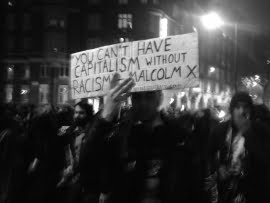 At the time of their assassinations, both Martin Luther King and Malcolm X were embarking on a course towards opposing the capitalist system. It is clear from reading and listening to their final speeches that they had both evolved similar conclusions as to capitalism’s role in the maintenance of racism. That is why they were neutralised.
At the time of their assassinations, both Martin Luther King and Malcolm X were embarking on a course towards opposing the capitalist system. It is clear from reading and listening to their final speeches that they had both evolved similar conclusions as to capitalism’s role in the maintenance of racism. That is why they were neutralised.
Unlike Malcolm X, who never got the opportunity to act upon his convictions, Martin Luther King was organising a movement to obtain his stated goals when he was assassinated in Memphis. He was in Memphis to build “the coalition of an energised section of labour, negroes, unemployed, and welfare recipients” in support of striking municipal garbage workers.
If such a force had been launched, the whole power of the anti-war and civil rights movement in the 1960s could have transformed the labour movement and become “the source of power that reshapes economic relationships and ushers in a breakthrough to a new level of social reform.”
Such a coalition, as King envisioned it 33 years ago, is needed today. The best tribute to Martin Luther King and Malcolm X would be to begin anew to build a movement based on the ideas and the concepts they developed by the time of their untimely deaths.
Unfortunately, the civil rights movement, after Martin Luther King and Malcolm X, subordinated independent mass struggle in the streets to electoral activity: to elect Democrats. Black Democratic politicians under the slogan: “vote for me and I’ll set you free,” began distributing “war on poverty” money to black organizations. What W.E.B. DuBois called the “talented tenth” got government jobs and became comfortable. This whole process demobilised the civil rights movement of the black masses, who were subsequently left behind.
Today, the bankruptcy of this policy has hit home for all workers, as pensions, wages, our standards of living and so on are under attack and devalued by inflation. Blacks and other minorities especially have faced the brunt of these attacks, as they disproportionately occupy the ranks of the unemployed and the underemployed.
On the question of civil rights, conditions have reverted to the 1960s for the black masses and for Latinos. According to the Harvard Civil Rights Project, the nation’s schools have become re-segregated along black, Latino and economic lines. Throughout this country, the inner cities are being gentrified as blacks and the poor are forced out and scattered throughout the land.
The action in response to Hurricane Katrina and the explosion of the immigrant rights movement – a reflection of the rise of the indigenous people of all of Latin America for their rights – bring hope for a better future and are just a hint of what’s to come.
Fight racism! Fight for socialism!
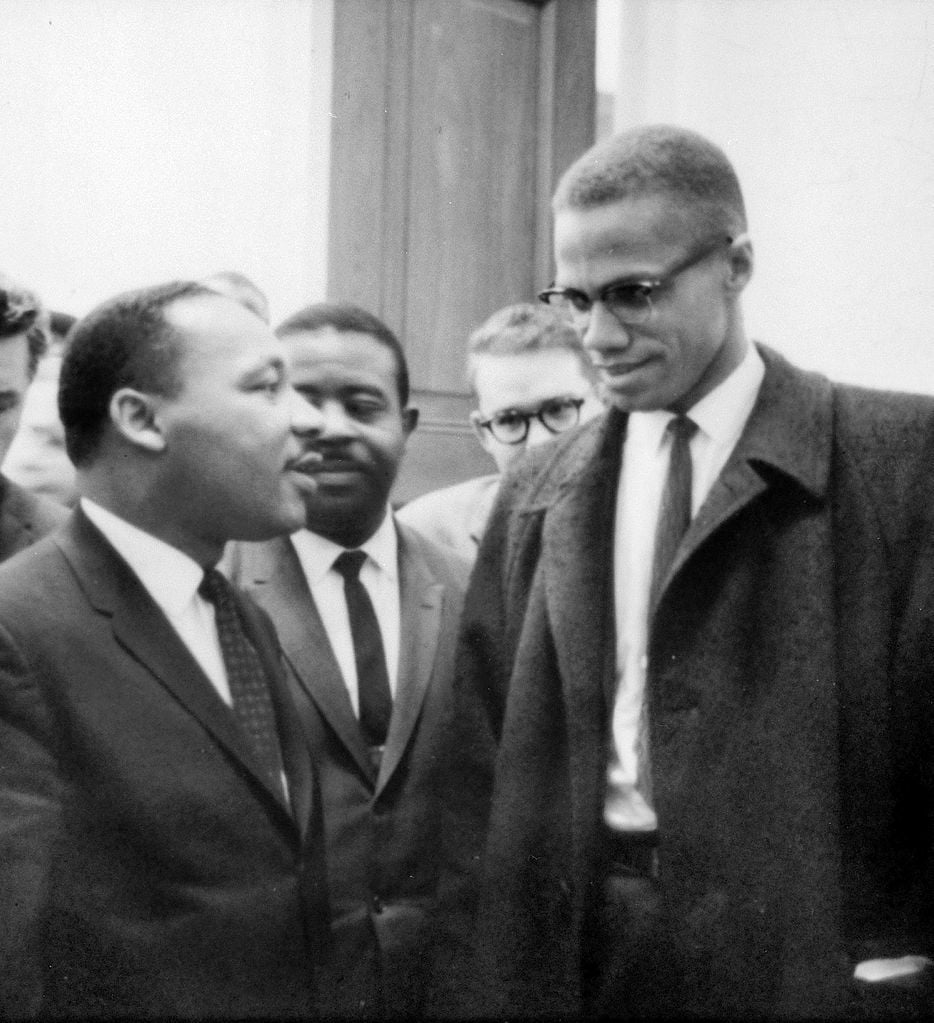 As we make a balance sheet of the civil rights movement against the backdrop of the world and domestic situation at the opening of the 21st century, it is clear that Dr. Martin Luther King’s ‘Dream’ is not possible under the nightmare of capitalism. The modern-day tyranny of the multinationals and their beholden representatives in government is based on dividing working people worldwide on the basis of race, nationality, and gender.
As we make a balance sheet of the civil rights movement against the backdrop of the world and domestic situation at the opening of the 21st century, it is clear that Dr. Martin Luther King’s ‘Dream’ is not possible under the nightmare of capitalism. The modern-day tyranny of the multinationals and their beholden representatives in government is based on dividing working people worldwide on the basis of race, nationality, and gender.
Under capitalism there is no way forward for black and Latino workers, nor even for their white counterparts. If the system of capitalism is based on the exploitation of labour, and one of the foremost methods of capitalist exploitation of Labour is the weapon of racism, how can any lasting solution to this problem of humanity be achieved under capitalism? As Malcolm X said: “Racism is profitable, if it wasn’t profitable it wouldn’t exist.”
The only permanent solution to the exploitation and oppression of African-Americans is socialism, based on the multi-racial working class becoming the masters of their own society, culture and economy.
Only on this basis can the age-old double exploitation of blacks be eliminated and replaced by a society fit for all human beings to live in. Only on this basis can the African-American working class take their rightful place, alongside their other class brothers and sisters, as masters of the country that was built by the blood and sweat of slavery: both the chattel slavery of the plantation and the wage slavery of the city.
The lesson of this history is that if we keep our politics independent of the Republican and Democratic Parties and the government; if we rely upon our own power in the streets; if we take up the struggle where Malcolm X and Martin Luther King left off, we will win.





